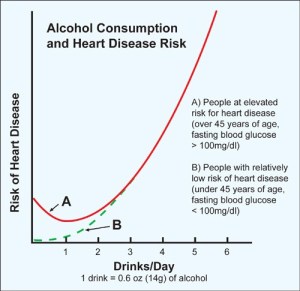Alcohol and Heart Disease
Research has shown that the consumption of alcohol in moderation reduces the risk factors associated with coronary artery disease. A moderate amount of alcohol refers to an average of one to two drinks per day for men and one drink per day for women. Drinking alcohol in excess or consuming three of more drinks per day can lead to a variety of adverse effects including liver disease, heart failure, arrhythmias, stroke, increases the risk of cancer, neurological complications, and unintentional injuries. Excessive alcohol consumption and binge drinking attribute to the third leading lifestyle-related cause of death in the United States.
What are the benefits of alcohol on heart disease?
Drinking alcohol in moderation has been shown to improve cardiovascular health, particularly in regard to coronary artery disease and reducing the risk of a heart attack. Multiple studies have described a J-shaped curve relating the benefits of moderate alcohol intake to a reduction in the risk of morbidity and mortality of coronary artery disease. The lowest amount being about two drinks (20 grams) per day reduces the risk of coronary artery disease, while the consumption of three of more drinks (70 grams) is associated with a greater risk.
The benefits of moderate alcohol consumption include:
-
- Improvement of lipid profile:
- Increases High Density Lipoprotein Cholesterol (HDL-C) – this is the most notable benefit as this healthy cholesterol, HDL-C, removes cholesterol from the arterial wall and transports it back to the liver.
- Decreases Low Density Lipoprotein Cholesterol (LDL-C) – sometimes referred to as your Lousy cholesterol because LDL-C builds up in the arterial wall making them narrow.
- Improves Cholesterol (both HDL and LDL) Particle Size– improves HDL-P that reduces the risk of cardiovascular disease and reduces cardiovascular morbidity and mortality.
- Reduces thrombosis (clotting formation)
- Reduces platelet aggregation
- Reduces fibrinogen– this promotes blood clotting
- Increases fibrinolysis – this is a process by which clots dissolve
- Additional effects
- Reduces coronary artery spasm in response to stress– by relaxing the vessel
- Increases coronary blood flow
- Reduces blood pressure
- Reduces insulin level
- Increases estrogen level– this increases HDL levels and reduces LDL levels and reduces platelet aggregation
- Decreases C- Reactive Protein– marker of inflammation
- Antioxidant– flavonoids found in grapes (wine) reduce free radical damage in the heart and vessel
- Improvement of lipid profile:
The effects of moderate alcohol consumption in the average study population has shown reduced risks of a new diagnosis of coronary artery disease by 29% and a risk reduction of deaths from cardiovascular disease by 25%. The risk of death due to a heart attack or coronary artery disease was reduced by 25%.
Should I consume alcohol with meals?
Drinking with meals has been found to reduce blood pressure and have a positive affect on lipids and the dissolution of thrombosis; although the relationship of moderate alcohol consumption has not been proven to reduce coronary artery disease.
Also, the presence of food in the gastrointestinal tract may reduce alcohol absorption or increase the rate of alcohol excretion from the body.
Does the type of beverage matter?
The type of beverage either wine, beer, or liquor does not matter. It is the alcohol which reduces the morbidity and mortality of cardiovascular disease. Although, red wine has an added affect due to the antioxidant properties.
Who should not consider alcohol consumption?
Excessive alcohol intake can lead to liver disease, heart failure, increased risk of cancer, neurological complications, and unintentional injuries.
Excessive alcohol consumption shows an inverse relation between alcohol and coronary artery disease that appears to increase LDL-C and lower HDL-C.
People should NOT start drinking if they already do not drink.
In addition, even moderate alcohol consumption should be avoided whenever consumption would put an individual People with medical and social conditions that are made worse by alcohol. These people should not consume any alcohol whatsoever including those with prior diagnosis of:
-
- Hypertriglyceridemia
- Pancreatitis
- Liver disease
- Porphyria
- Uncontrolled hypertension
- Congestive heart failure
Pregnant women and persons on medications that interact with alcohol should refrain from alcohol consumption. Also those with personal or strong family history of alcoholism should avoid all alcoholic beverages.
What are the recommendations?
Consult a physician about the benefits and risks of alcohol consumption personal to your health.
Those with prior diagnosis of hypertriglyceridemia, pancreatitis, liver disease, porphyria, uncontrolled hypertension, congestive heart failure or pregnant females or persons on certain medications that interact with alcohol should avoid alcohol consumption.
If your physician approves and there is no contraindication for alcohol consumption present, moderate consumption of alcohol (one or two drinks per day) may be considered safe.
Alcohol should never be consumed when operating heavy machinery or motor vehicles.
The risks and benefits of alcohol consumption should be reviewed periodically with your physician. Adolescents and young persons are not recommended for alcohol consumption and should be targeted for assessment and advice before potentially harmful habits of consumption become established.
Alcohol affects the entire body, but has limited benefits, mainly on the coronary arteries. A careful approach must be warranted for alcohol consumption.
Each person has a unique combination of factors such as age, sex, and family history that influence a personal risk for specific diseases potentially caused or prevented by alcohol use. The balance of the risks and benefits of alcohol consumption for each person will be unique.

